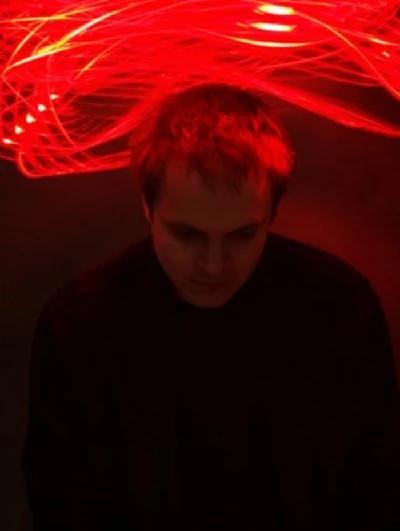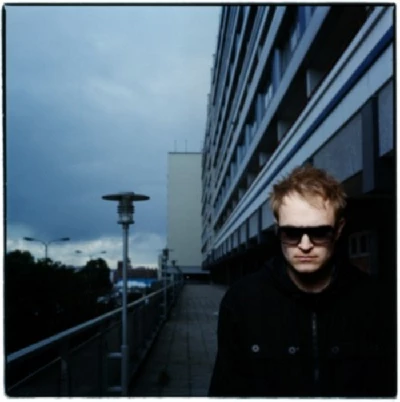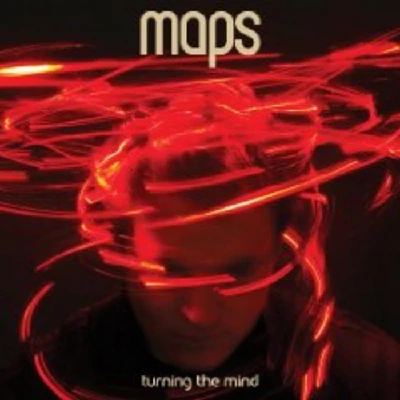Maps
-
Interview
published: 1 /
12 /
2009

In our second interview with him, Anthony Strutt speaks to James Chapman from electrinic outfit and Mercy Prize nominee about his project's second album, 'Turning the Mind'
Article
Maps is the project of electronic artist James Chapman.
Chapman has now released two albums as Maps, 2007’s Mercury Prize-nominated ‘We Can Create’ and this year’s ‘Turning the Mind’.
While ‘We can Create’ had a shoegazing sound, ‘Turning the Mind’ is more dance-oriented.
In our second interview with him, James Chapman spoke to Pennyblackmusic at a show in London at the end of a UK tour about ‘Turning the Mind’.
PB: What I want to do with the first part of this interview is go through my recent review for ‘Turning the Mind’ album and you can tell me if you think I got it right or if it's just nonsense.
JC: Okay, that sounds good (Laughs).
PB: Is there any reason why you decided to call it ‘Turning the Mind’.
JC: Yeah, the album is basically about mental states. It is quite a personal album to me. It is more personal lyrically than the last album, ‘We May Create’. This may sound pretentious, but there’s a practice called Mindfulness which is a therapy thing. It started off as a Buddhist thing, and it is now accepted as a form of therapy. I have been on a bit of a psych/addict rollercoaster for the past decade so I thought I would put a bit more of me into this album. And I did. I said a lot and got a lot off my chest. Turning the Mind is one of the practices of Mindfulness. It’s about turning the mind towards reality, so it seemed right for the title.
I was interested in the reasons behind the therapy. I just thought that I didn't want to write lyrics which I didn't want to talk about. I'm definitely up and free to talk about anything. It was a lot more personal to make. I'm really proud of it, and I like it a lot more then ‘We Can Create’.
PB: They say you have a lifetime to write the first album. After that it gets harder with deadlines and tours and so on.
JC: With ‘We Can Create’ that was kind of true, I had about seventy or eighty demos that I had done over the time since I was 18. We had all this material to sieve through and we were spoilt for choice. It was hard to actually choose the songs for that album when we recorded it in 2006.
I was 28 then so it was ten years worth of songs. I started writing when I was 18 years old and playing in local bands. I then got a four track. I love to create and I never stopped.
PB: Onto the album itself, I said of turning the opening track, ‘Turning the Mind’, that it is quite fragile with Mojave 3 elements and then it becomes more electro. I did find this album to be much more of an electro and dance album. ‘We Can Create’ was more Nu Gaze and My Bloody Valentine- influenced.
JC: I wanted to get away from the shoegaze thing. I never saw myself as part of it. With the sounds I was making, I wasn't trying to be Kevin Shields or anyone else. It was just the sounds in my head. It did me a lot of good. It got me coverage, but I wanted to be purely electronic. I wanted to go back to the roots of Maps. I didn't want us to be seen as an indie guitar band.
PB: When I saw you at the ICA playing material from ‘Turning the Mind’ for the first time, I was shocked at how very different it was to the material on the first record.
JC: We had a lot of fun, but by the end it wasn't what I wanted to do. With this album, I was completely somewhere different. I haven't even listened to a Sigur Ros album. When I wrote this, I was listening to a lot of techno and house and really dubby stuff. I just moved in the way that I wanted to move in.
The live thing has moved on too. It’s just two of us on stage now. We have fun. It’s all electronic. I don't listen to guitar music at all. When you listen to techno, you are not going to write a guitar record. For the next album, it may all be free jazz. Who knows (Laughs)?
PB: I described ‘I Dream of Crystal’ as being light and trippy, sort of intelligent music for indie fans.
JC: Okay, that’s interesting. Yeah, I like that. I think it was one of the first tracks that I wrote for this.
PB: ‘Let Go of the Fear’ was a single.
JC: It was a download, a white label download. Pete Tong played it a few times.
PB: I said about it that it was an out and out dance number, as commercial as anything by Kylie and it sounded like a remix, while your vocal sounded smoky and like that of Anthony Reynolds from Jack hitting town on the best red wine. Do you know Anthony Reynolds’ music?
JC: Yeah, Jack, of course. ‘White Jazz’? Okay, that’s good. Cross out the Kylie thing though.
PB: I meant it in a dance way. Was it a big download then?
JC: Yeah, it did really well. It was like one of Pete Tong's big ones.
PB: Mute is known as a label that does a lot of remixes. If someone does a remix of one of your songs, do they come to you first to ask if they can do it? If you don't like it, can you refuse for it to be released?
JC: Oh, yeah. If it’s a guy farting down a microphone, then I'm not going let them release it. Tim Holmes and I did a lot of work on the version of ‘Let Go of the Fear’ that made the album and he made it sound a lot friendlier. It was more like a co-production. The original isn't that much different.
PB: I said about ‘Valium in the Sunshine’ that it has a more familiar Maps sound and that it is gentle on the head and a song to sway along softly too.
JC: I am probably supposed to say here that it is a song about a girl, but a lot of this album is about experiences which I'm not proud of. It’ has all been a learning curve and I came through it and I'm still alive.
PB: I read somewhere that there were drink and drugs involved. In the music biz, that’s par for the course. You easily get offered them.
JC: I have knocked everything on the head now. I don't drink now or do drugs now, but I'm addicted to valium still. I'm going to a clinic to sort that out though and then I'm going to be stone cold sober for the rest of my life. I can't remember my twenties and I want to remember my thirties. With that track though, I wanted to convey the feeling of being as blissed out as possible and being on valium and in the sunshine, which is a fucking great feeling.
PB: ‘ Papercuts’ is soft and gentle, until it speeds up right at the end.
JC: With ‘Papercuts’ I wanted to make it as repetitive as possible. It's about every day things that get to you. I was pleased with it. It's one of the darkest tracks on the album.
PB: I said about ‘Love Will Come’ that it is like the Pet Shop Boys jamming with Tubeway Army,
JC: Okay, that's good. I like that (Laughs).
PB: ‘Everything is Shattering’ is a big, brash pop number. It reminds me of the Bernard Sumner/Johnny Marr band, Electronic.
JC. That is one of my favourites. I wrote that in a hotel because Daniel Miller, who owns Mute, asked me, “Have you written any fucking singles yet, James? And I was like, “I have written this eight minute epic track.” My blueprint for that was ‘Love Will Tear Us Apart’.
It is a really catchy song, but with dark but uplifting lyrics and at the end it sounds like the Beach Boys. I'm happy if people see me as a pop artist. I want to be popular. A lot of people see pop as bland, but it doesn't have to be.
PB: I saw ‘Nothing’ as having a hushed vocal with a slow groove until again it speeds up and gets much faster and becomes a club anthem.
JC: It is basically about a very hurtful relationship. I have got no time for the person involved, who fucked me over and I just thought that I would I get it out of my system (Laughs).
PB: I thought about ‘The Note (These Voices)’ that it sounds like Depeche Mode with dreamer-like vocals and was a song well worth rocking along to,
JC: That's good too. Again it’s a pop song. It's about leaving a suicide note. The lyrics on this are pretty fucking dark, but the music is uplifting. I wrote it after seeing the film, ‘Control’.
It really inspired me, It's not about Ian Curtis, but it's about what would go into a note if you didn't want to hurt anyone. It just got me thinking. I'm not going to kill myself. Just yet anyway (Laughs.)
PB: ‘Chemeleon’ sounds too me like Tubeway Army but more modern. It is also probably the song which has the most in common with ‘We Can Create’.
JC: Yeah, it’s the most old school Maps song on there. I think it’s definitely a grower. I worked at it for ages. The blueprint for that is ‘Positively 4th Street’ by Bob Dylan. He basically rips a guy apart in it. He doesn’t hold back his anger at all. There was a person who made my life a misery for three years and that’s a song about it. It’s about bullying, but that’s all done and dusted now.
PB: ‘Die Happy, Die Smiling’ is a big beats based number. It sounds to me like Mojave 3 having fun.
JC: That’s cool It has got a r ‘n’ b flavour. I just thought of that tune on a train to London and sang it into my phone. I wrote it really quickly in one night. It sort of says everything will be alright in the end. It's about hope. It's the next single.
PB: ‘Without You’ is massive in sound. I thought that it had big pop sensibilities. It ends the album on a high, doesn’t it?
JC: I see ‘Without You’ as like an acoustic end. I see ‘Die Happy’ as the big dramatic finish and then ‘Without You’ as the full stop. It is about being sober. It is about drink and drugs. It is about after ten years finding out that I had something of a problem (Laughs).
PB: And now for the interview.
JC: Okay (Laughs).
PB: Why the name Maps?
JC: I used to be called Shortbreak Operator, which is the worst name imaginable. I actually released an EP under that name. I was young. I got it from a holiday brochure.
I worked out that it was a shit name, but I wanted to keep that sense of journey and escape that comes with it and. to be honest, I thought Maps was a fucking great name.
PB: Which was the hardest album, to make, ‘We Can Create’ or ‘Turning the Mind’?
JC:‘We Can Create’. I had no ideaiI was recording an album. I never thought I would get signed.
PB: ‘We Can Create’ was recorded in your bedroom studio. Was ‘Turning the Mind’?
JC: Yes, but the demos were far better advanced as I knew how the equipment worked better then. I took the demo to Tim Holmes who was the silent partner in Death in Vegas and who has been brilliant, and we looked at each track and just worked at each one. A lot of the demos stayed close to the original.
PB: Thank you.
Picture Gallery:-

